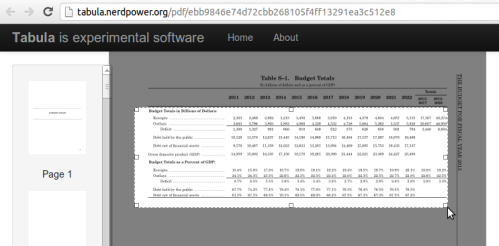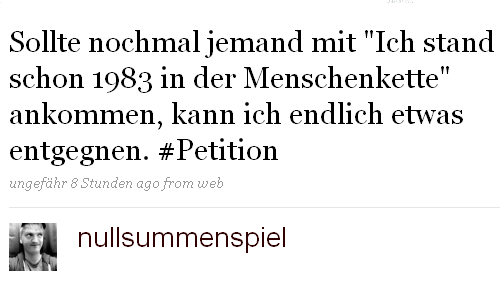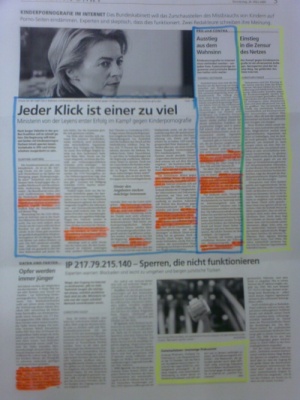Mal wieder ein Open-Data-Rundumschlag: den Einsteig macht ein Interview der bpb mit Marian Steinbach, der auf der rp13 seine Bemuehungen vorstellte, die Datenformate von Ratsinformationssystemen zu standardisieren. Ueberraschenderweise machen hier die RIS-Anbieter richtig Dampf, man darf gespannt sein – nicht zuletzt, weil auch Ulm hier etwas anbieten moechte – und somit irgendwann auch fuer Ulm ein Angebot wie offeneskoeln moeglich sein koennte.
♦
Aus Koeln kommen auch einige Wunschlisten, was man sich denn gerne so alles wuenschen wuerde: Einmal eine Open-Data-Wunschliste fuer NRW, einmal die Variante fuer die Stadt Koeln.
In Muenchen scheint das Engagement derweil eingeschlafen zu sein und sich gar nichts mehr zu tun – was Roland Moriz so geaergert hat, dass er ein Blog eingerichtet hat und nun nach MitstreiterInnen sucht.
♦
Oft ist das Problem ja nicht einmal, dass Daten gar nicht verfuegbar waeren, sondern dass sie in irgendwelchen PDFs versteckt sind. Noch schlimmer ist, wenn das PDF-Tabellen sind, da wird dann selbst das Parsing mit pdftotext… anstrengend.
Introducing: Tabula. Die freie Software kann einfach von Github gezogen und lokal installiert werden – danach koennen beliebige PDFs hochgeladen und die zu parsenden Tabellen per Drag and Drop ausgewaehlt werden. Poof: Eine CSV-Tabelle! Hurra!
Eine Livedemo (bei der man aber nichts eigenes hochladen kann) gibt es hier.
Weitere PDF-Exporter neben tabula und pdftotext – insbesondere auch fuer Windows-Systeme – sind nebenan bei der Knight Foundation gesammelt.
♦
Nachdem’s hier schon lange nix mehr zu Geodaten und Karten gab, und R auch nicht jedermanns Sache ist, hier der Verweis auf Lisa Williams‘ Blog, speziell auf die zwei Artikel The Insanely Illustrated Guide To Your First Data-Driven TileMill Map und The Absurdly Illustrated Guide To Your First Dynamic, Data-Driven Timeline.
Beide Artikel sind in der Tat wahnsinnig absurd hervorragend bebildert und zeigen den kompletten Weg zum fertigen Produkt – im Fall der Karte also tatsaechlich von der Datenakquise ueber eigene Geocoding-Scripte in Google Docs (sic!) bis hin zur angepassten TileMill-Karte. Sehr schoen!
(Wer Spanisch kann, kann solcherlei Dinge auch im neuen MOOC der Knight Foundation lernen, der aktuell stattfindet)
♦
Wer trotzdem gerne mit R arbeiten moechte: Da gibts nun eine neue Version des OpenStreetMap-Packages, das nun auch jede Menge zusaetzlicher Tileserver unterstuetzt. Einziger Nachteil: Hat Java-Dependencies.
(via)
♦
Noch ein Kartenfundstueck: Die ÖPNVKARTE nutzt die OpenStreetMap-Daten, um eine um Nahverkehrsdaten angereicherte Karte auszugeben. Huebsch.
♦
Tiaga Peixoto stellt die Frage, ob „Open Government“ ueberhaupt etwas mit Transparenz und vor allem Rechenschaftspflicht zu tun haben muss:
ABSTRACT
By looking at the nature of data that may be disclosed by governments, Harlan Yu and David Robinson provide an analytical framework that evinces the ambiguities underlying the term “open government data.” While agreeing with their core analysis, I contend that the authors ignore the enabling conditions under which transparency may lead to accountability, notably the publicity and political agency conditions. I argue that the authors also overlook the role of participatory mechanisms as an essential element in unlocking the potential for open data to produce better government decisions and policies. Finally, I conduct an empirical analysis of the publicity and political agency conditions in countries that have launched open data efforts, highlighting the challenges associated with open data as a path to accountability.
[…] CONCLUSION
As a whole, this analysis advises caution on the part of policymakers and advocates with regard to the potential of open data to foster accountability. Even when data is politically important, accounting for the publicity and political agency conditions might be a commendable reflection for a better understanding of the prospects and limits of open data.
PEIXOTO, Tiago. The Uncertain Relationship Between Open Data and Accountability: A Response to Yu and Robinson’s The New Ambiguity of “Open Government”. DISCOURSE, 2013, 60. Jg., Nr. 6.
(via)
♦
In eine aehnliche Richtung geht auch dieser DLF-Bericht u.a. mit Ina Schieferdecker, Michael Kreil et al.
(via)
♦
Und zum Schluss noch ein wenig Urheberrecht. Denny Vrandečić (u.a. von Wikidata) exkursiert eine Weile ueber Lizenzfragen bei Daten(banken) und kommt zu dem Schluss, dass mensch hier bei der Veroeffentlichung allenfalls CC0 als „Lizenz“ verwenden sollte – mit dem Argument dass, wer CC-BY oder ODbL verwendet, die Position staerkt, dass rohe Daten ueberhaupt schutzfaehig im Sinne des Urheberrechts sind:
The extension from works to content, from expression to ideas, is another dimension, this time in scope instead of time, in the continuous struggle to extend and expand intellectual property rights. It is not just a battle over the laws, but also, and more importantly, over our believes and minds, to make us more accepting towards the notion that ideas and knowledge belong to companies and individuals, and are not part of our commons.
Every time data is published under a restrictive license, “they” have managed to conquer another strategic piece of territory. Restrictive in this case includes CC-BY, CC-BY-SA, CC-BY-NC, GFDL, ODBL, and (god forbid!) CC-BY-SA-NC-ND, and many other such licenses.
Every time you wonder what license some data has that you want to use, or whether you need to ask the data publisher if you can use it, “they” have won another battle.
Every time you integrate two data sources and want to publish the results, and start to wonder how to fulfill your legal obligation towards the original dataset publishers, “they” laugh and welcome you as a member of their fifth column.
Let them win, and some day you will be sued for mentioning a number.
(via @johl)



